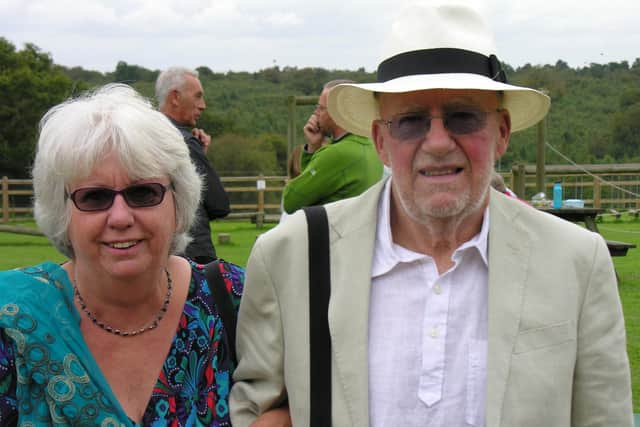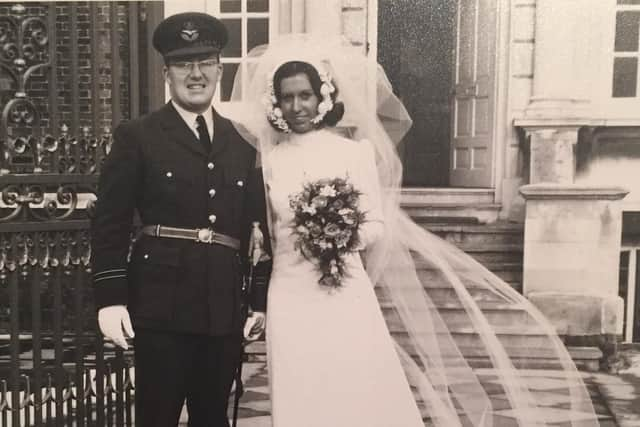World Alzheimer’s Month: Diary of Sussex dementia carer shows people you are not alone
and live on Freeview channel 276
Geraldine Durrant from East Grinstead, is a former journalist and author, her husband Patrick, 78, was diagnosed with Lewy bodies dementia in June 2021
Geraldine starting to chart her emotions and turmoil with being a full-time family carer in a diary she named Midsummer Madness.
Advertisement
Hide AdAdvertisement
Hide AdShe said: “Nothing however dreadful is wasted on a writer. I began the diary when he was first diagnosed as it helps getting things off my chest. After reading stories from carers online, I realised others might recognise their struggles on our own and feel less alone if I shared it. So I did, changing our names to James and Georgina to preserve my husband's privacy at first, which has stuck.”


She admits that the book is not all doom and gloom as she also discusses light-hearted things that happen in their lives, adding that putting pen to paper helped her deal with grief.
“His diagnosis caused a huge ripple in our pond, and we felt on our own from the beginning of this journey,” she said.
“I was surprised that following Patrick’s diagnosis, we were not called in by the GP. It took a long time to navigate the system so if the blog can help direct people in the right direction during their difficult times, I will take that small win.
Advertisement
Hide AdAdvertisement
Hide Ad“Patrick was recently in hospital for five weeks with an infection. They promised to send him to a local care home for rehab while we got a care package in place. But they would not send him home to me without a care package, and I could not fix a care package as there were no available carers.


"I got the impression my husband would have been in hospital indefinitely, so used a significant amount from our savings to pay privately and get him into a local Dementia Care Unit. What is obvious, is that there is very little official support.
“It would have been cheaper to send my husband to the Caribbean for a fortnight holiday than have respite at home. It would be one thing looking after someone with dementia if you were fit and in your 20s, but I am an old lady with a couple of replacement joints."
Alzheimer’s Society is calling for every primary care network to use the government’s funding for support roles in primary care to provide at least one dementia support worker in their area. These are specialists in the community who provide the missing link between people affected by dementia and support after a diagnosis.
Advertisement
Hide AdAdvertisement
Hide AdA primary care network is a group of local community, mental health, social care, pharmacy, hospital and voluntary services working with GP practices to provide integrated health and social care for people close to home.
Jolian Ardolino, Alzheimer’s Society area manager for Sussex, said: “Post diagnostic dementia support is unequal, inadequate and inconsistent, leaving families without the necessary care they need to get through some of the hardest and most frightening times of their lives. People need the right support from the moment of diagnosis.
“Having a dedicated dementia support worker in every area would plug the gaps we are seeing in primary care, give people the one point of contact to help them navigate the health and social care system and ease pressure on health services. Dementia support workers provide a crucial link between the 26,520 people living with dementia in Sussex and post diagnostic support."
Dementia is a complex condition and support needs are often more specialist than those provided by primary care currently. This includes help with daily tasks, fall prevention, going to community groups and talking therapy to improve wellbeing and prevent mental health crises. Alzheimer’s Society claim that this type of support could be arranged through close relationships with dementia support workers.
Advertisement
Hide AdAdvertisement
Hide AdDementia was the leading cause of death in England in July this year accounting for 11 percent of all deaths. It was also the 13 consecutive month as the country’s biggest killer.
During world Alzheimer's month researchers are urging people from across the region to sign up to Join Dementia Research, a national register designed to give people access to potentially life-changing dementia research.
The register is for anyone over the age of 18, with or without a dementia diagnosis can sign-up to take part in dementia research.
One study being led by researchers at Brighton and Sussex Medical School and taking place across the Kent, Surrey and Sussex region is DETERMIND (Determinants of quality of life, care and costs, and consequences of inequalities in people with dementia and their carers).
The study is looking at the care people with dementia receive after their diagnosis to see how their quality of life is affected and then look at what can be improved. The study is being supported by the National Institute for Health and Care Research (NIHR) Clinical Research Network Kent, Surrey and Sussex.
Advertisement
Hide AdAdvertisement
Hide AdDr Ben Hicks, Research Fellow and Programme Leader for DETERMIND said: “We are looking for people who have been diagnosed with dementia and their carers to take part in the study. One way people can show their interest in taking part is by signing up to Join Dementia Research.”
For more information visit the Join Dementia Research website.
For support and advice on dementia, call Alzheimer’s Society on 0333 150 3456 or visit alzheimers.org.uk
You can read Geraldine’s diary, Midsummer Madness here.